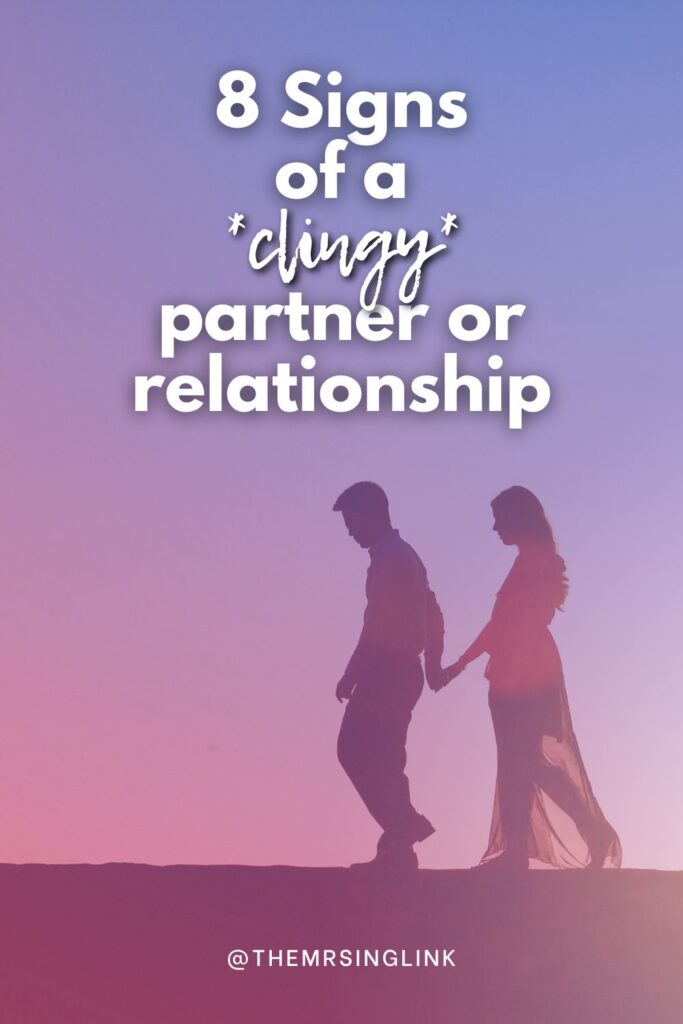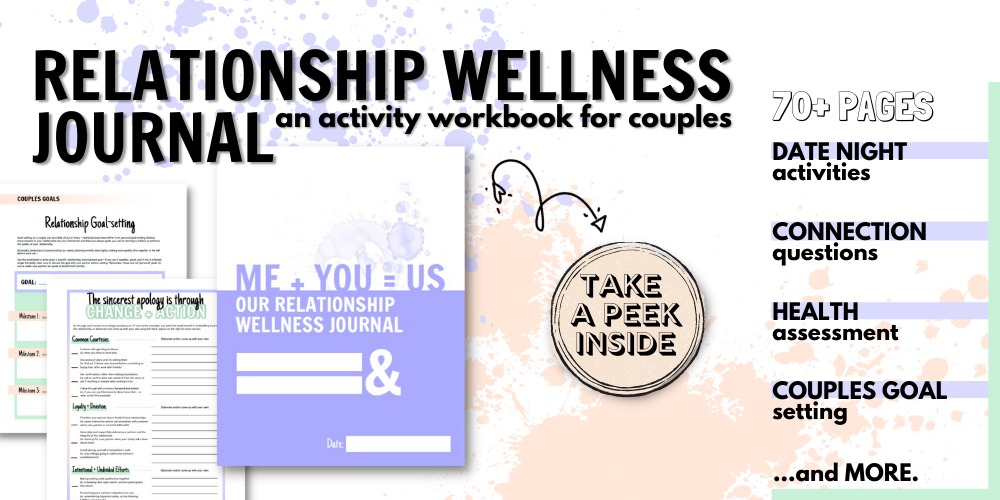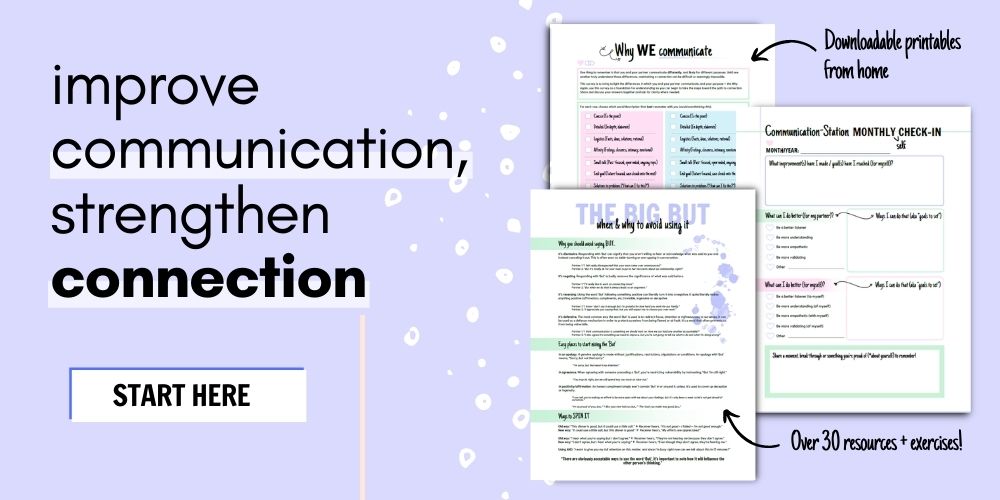It’s no surprise – we’re already quick to label clinginess by its select and stereotypical qualities. But what are some of the brushed-under-the-rug signs of a clingy partner or relationship? You know, the soft spots we’re not really ready to touch on.
This isn’t talked about as much, but the damaging effects – IMO – can be far greater for the clingy individual. The weight they carry is much heavier, with lasting and ongoing effects, and this weight is often mistaken as a *void* they deem their partner responsible of filling or compensating. Clinginess is simply another form of self-harm, if you really think about it.

8 Signs of a clingy partner or relationship
Persistent boundary violations
I think it would be unrealistic to say we can achieve perfection when it comes to upholding and respecting boundaries. We are bound to cross [some form of] lines with others, like our partner’s and even our own boundaries. When we’re blatantly unaware and unwilling to acknowledge this becomes problematic.
To a clingy partner or relationship, essentially there are no bounds. *A clingy partner will also be guilty of violating their own personal boundaries, if they have any at all. And when violating boundaries are persistent – meaning, they are continuous regardless of correction or followed consequence – is when a relationship has entered dangerous territory. As a result, a clingy relationship is more likely to continue enabling violated boundaries rather than respecting and upholding them.
[Related Read: How to avoid being clingy, even if you think you aren’t]
Demanding “excessive” reassurance and validation
They key words here are demanding and excessive. *This point is also not to be confused with asking/inquiring. There will be times where we may have to ask our partner for reassurance and validation, or to explain how you feel the most loved. As imperfect human beings [partners], we’re not always going to get this right (or at the right time) nor are we mind readers (when needs change).
Demanded reassurance, IMO, won’t necessarily be *authentic* reassurance. If you’re forcing your partner to do something, it won’t be done willingly, at heart, or by their own free will. Besides, no one should have to demand reassurance or validation from their partner. And if the demand for reassurance is excessive, IMO, there’s little chance reassurance from your partner will be enough. *There’s a deeper-rooted issue beneath the surface.
Unfortunately our culture is driven by a constancy of external validation (by others, social media, money, etc.) – to the point we are losing (or have lost) the suffiency of self-validation and contentment. If expectations of our partner exceed their capacity (what they’re able or willing to give and provide), and we place our fulfillment solely on them, then we will stay in [cling to] a constant loop of disappointment and unfulfillment.
Expecting constant contact
Notice I didn’t say communication. Communication is different because it involves the what, why and how. Being in constant communication means efficiency and effectiveness, focusing on quality over quantity, whereas many confuse this for being in constant contact. Worse off is when contact is expected. This is a sure-fire sign of clinginess, and sometimes its enabled by both parties!
Being in constant contact is fairly subjective, so it looks different to everyone. But where is the hard line drawn that spells “clingy”? It’s important to consider the expectation. I think it *starts* when you’re using communication from a place of insecurity. For instance, needing to hear back from them in order to *feel better* about yourself, about them, and where you stand with that person or in the relationship. A clingy partner will often vocalize this *expectation* (or when this expectation is not being met) and justify their behavior by deeming constant contact as emotional responsibility. For example, “I’ll know you really like/*Love me if you ..[text back within the hour, respond to every one of my texts, text me Good-morning and Good-night every day].”
[Related Read: The steps to better communication with your spouse]
Let’s not forget, though, it’s perfectly natural to eagerly *want* to hear from your partner, or from someone new you’re seeing, as much as it is to eagerly *want* to connect with them (to reach out or be in contact). Therefore, yes, HEALTHY communication is the bare minimum, but we should also be mindful of when expecting constant contact becomes an over-reach [*too much]. The same way no-contact or ghosting is *too little – this is considered neglectful.
At the end of the day, people have a [certain/limited] capacity to receive and give back, and communication is no exception to that capacity. With that, a clingy partner or relationship will typically only regard their own and set their individual capacity as *the standard*. Yet in this day in age contact is considered no-exception and no-excuse with as instantaneous and readily available it is at our fingertips; “There’s no excuse why they can’t send a text when it takes 5 seconds!” We have to be very careful because we’re also prone to abusing that statement as entitled access to people’s time and energy, especially if it’s *constant*.
Hyper-vigilance and sensitivity
It’s like that song by The Police – “..every step you take, every move you make, I’ll be watching you”. I’m hesitant to even say this, because many of us are guilty of hyper-vigilance and sensitivity these days (even myself!), but if your *comfortable* approach to relationships is to be more surveilling then your relationships are not *freeing*. What do I mean by this exactly? If you feel you *have to* have a constant ear or eye open, or you’re [negatively, deeply] affected by every little thing your partner says or does, then how is this a loving relationship if it is not *freeing* (unchained, liberated, weightless)?
Did you ever think it could be harmful to be *too aware* or to feel *too much*? Empaths now entering the chat. When we’re hyper-vigilant and hyper-sensitive in life, this looks like abnormal/*excessive alertness (i.e., to danger, or potential threat, *sensing*/feeling the energy or feelings in others) as well as having an abnormal/*over-reactive response, particularly to emotional stimuli (i.e., getting easily overwhelmed, prone to stress, having dysregulated, more intense [reactive] emotions). *This is not to say we aren’t supposed to be vigilant, empathetic or sensitive!
Maybe it’s just me but as someone who struggles with this – hyper-vigilance and hyper-sensitivity – it can feel very imprisoning, especially when I tie these things to my identity (being part of *who I am*). This can also be pretty self-destructive, intentional or not. So when it comes to relationships we aren’t necessarily quick to see this as being a *problem*. We’re even less likely to admit the negative extremes of these behaviors as being “clingy”, when the reality is a greater number of people today live a life of hyper-vigilance and hyper-sensitivity and deem it as being *normal*.
Dictative and combative mannerisms
What would be considered dictative and combative in relationships similar to other areas of life? To be dictating (not to be confused with authoritative) is to be, for lack of better terms haughty, oppressive, and arrogant. To be combative (not to be confused with assertive) is to be aggressive, quarrelsome (ready to fight) and antagonistic.
How is this considered clingy? A person who *clings* to a need for control is also clinginess. We may need reminding that clinginess isn’t strictly the need for excessive or exaggerated attention and affection – it’s also the need for control.
We’re all well versed in the classic, super jealous, clingy girlfriend stereotype, right? This woman is typically cynical, arrogant (even though , on the inside, she actually has very low self-esteem) and just straight up testy. Lo and behold, this may even be your modern-day boss b*tch and hyper-independent, “don’t need a man” kind of woman (YESSSS, this *also* applies to your uber aggressive, controlling, “women are the weaker sex”-believing, toxic-masculinity type men); yet she’s practically always ready to *pick* a fight with her partner while weaponizing her jealousy and falsified arrogance as a way to try to control and *test* her partner.
Exaggerated helplessness and incompetence
Obviously, this would be the opposite of authoritative and combative, but still very much a sub-category of clinginess. When I say exaggerated helplessness, I’m talking about the damsel in distress or today better known as the *pick me* type. For men, they are typically more passive-aggressive and hard-leaning *feminine* in this area.
What does this helpless and incompetent clingy partner look like? For starters, they may be over-functioning or under-functioning individuals – to the point where they do, quite literally, seem lost, helpless, stagnant (lazy, dormant), and even jaded. The clingy partner is also prone to having no solid grip on who they are, with the exception of when in a relationship. These individuals typically define or look for themselves in others. Oh boy, here is where I raise my hand, AGAIN – guilty! And I’m not ashamed – I’m learning, overcoming and learning again, the same as everyone else on this planet.

You’re probably wondering…how is the incompetent individual considered clingy? We can look at incompetence as simply not knowing or able, or as weaponized incompetence. We’ve all heard that lovely term by now. A clingy partner heavily and unhealthily depends [way TOO much] on their significant other, as would a clingy relationship heavily and unhealthily depend on *being* in a relationship (to feel *complete*, to be happy).
Weaponized incompetence is literally the same thing except with manipulative intent. For instance, a clingy partner weaponizes their behavior for personal gain – i.e., proving the quote to ring true that, “if I don’t do it, I know they will”. This is clingy AF because it self-justifies a lack of responsibility and accountability where it is, then, expected by *default* from your significant other.
Overbearingness and lack of personal space
We’ve finally reached a stereotypical quality of clinginess! Except, here, I touch on a slightly different take. For example, the significant other in the relationship who often feels smothered, bothered and overwhelmed would likely concur to having experienced being with – what they would define as – a clingy partner. Again, overbearingness looks different for everyone, and we’re usually quick to point the finger at clinginess for individuals simply having needs. Hence for those often labeled as being *too much*. So we have to be willing to ask ourselves: Are they, really? Or are we simply not willing or able to meet their needs?
When considering overbearingness and a lack of personal space, we’re talking about boundaries but more importantly a sense of separation. A clingy partner deeply lacks separation (from their partner and the relationship). Therefore they’re less equipped to respecting their significant other’s personal space. You might say these are typically individuals who move fast in their relationships with others. That’s why a clingy relationship will usually attribute a lack of personal space or separation to being *madly in love*.
“In a relationship where two people are head over heels for one another, you won’t *need* personal space or separation,” they’ll say. What’s often misunderstood is there’s a difference between *wanting* it and *needing* it.
[Related Read: The importance of space in relationships, especially if you fear losing him]
Reverse psychology as manipulation
In contrast, some people display the opposite of what is normally and obviously considered clinginess; more forward behaviors are now backward. Some withdraw emotionally and physically when deep-rooted insecurities are triggered. This withdrawal can be displayed as a way to get their partner to *pursue* them. For example, the partner who feels threatened when their partner talks to another attractive person may withhold or be less affectionate, as a response to their insecurity. The reverse psychology (as manipulation) here is that if one partner stops doing something (communicating, showing affection, withdrawing emotionally, caring less about the relationship)…then their significant other will start doing it (more).
A *detached* or distant partner doesn’t mean they aren’t *anxiously* attached in the relationship – hi, it’s me, again! A clingy partner can also be more indirect in terms of communicating their feelings and their needs in the relationship. Alas, indirect communication can also be weaponized. This is for the individuals who are expecting their partner to be a mind reader!
So just when you think clinginess only has to do with the *overabundance* of certain behaviors (attention, affection, lack of personal space), we should also consider the opposites.









